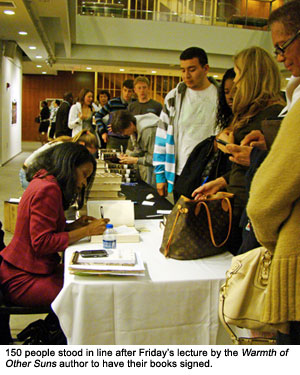Related Posts
var a2a_config = a2a_config || {};
a2a_config.linkurl = "http://mondaymorning.web.unc.edu/2011/02/22/diversity-and-inclusion-make-us-better-stronger-and-smarter/";
Wonderful lecture by Isabel Wilkerson


Last Friday night, we hosted a lecture by The Warmth of Other Suns’ author Isabel Wilkerson, with co-sponsors the School of Journalism and Mass Communication, Center for the Study of the American South and Center for Global Initiatives. It was a night to remember! Ms. Wilkerson’s topic was the Great Migration of six million Black Americans from the south to points north, midwest and west, the subject of her book. It’s a compelling book, and her lecture was magnificent, forceful, comprehensive and moving. As an aside, I never had thought about how many of music’s greats (e.g. most of the Motown hit singers, Jackson family, John Coltrane) had come up from the south or were children of parents who had migrated. Think about what it meant to leave one’s home in one’s own country, largely because of Jim Crow. Still, there is a universal quality to the immigrant experience regardless of country of origin. But there is something particularly awful about having to leave home, because of injustice in one’s own community. After reading the book, listening to Isabel and talking with a number of people, I believe the migration experience may explain some of the issues we haven’t understood about health disparities. It is part of the story, part of the culture and part of history. It’s amazing how little many people know about it.
I was excited that 300 people attended Isabel’s lecture, and it was one of the most integrated audiences I have seen at Carolina. Over 150 people stood in line afterwards to have their books signed by Ms. Wilkerson. Each person had a story to share with the author so the line moved slowly. One man told me that he was grateful that we’d opened the talk “to the public.” I told him “we are the public.” I mean that.
By the way, I heard several people say they were going to have conversations with their parents to learn more about their families’ immigration experiences. I asked my father questions about his father’s journey from Lithuania that I’d never asked before. When I showed surprise at the number of missing pieces in his knowledge of his own father, he reminded me that people did not talk about those things when he was growing up. My grandfather and the immigrants around him wanted to put the old country behind them and become Americans. That’s another reason why Wilkerson’s book is so important to the Great Migration.
Becoming more diverse
Sponsoring Isabel Wilkerson was, for me, part of a drive toward diversity in the School. This week, we host a minority alumni reunion the evening before our 32nd annual Minority Health Conference.
Our Diversity and Inclusion Task Force (DITF), chaired skillfully by Rumay Alexander, RN, PhD, Clinical Professor of Nursing and Director of Multicultural Affairs, and Bryan Weiner, PhD, Professor Health Policy and Management, is an important part of our diversity and inclusion strategy. The DITF is a real commitment to change by me the School’s leadership, task force co-chairs and its members. We are supporting part of Dr. Alexander’s salary to enable her to devote time to the effort. HPM chair Peggy Leatt, RN, PhD, has supported Dr. Weiner’s role. Brenda Motsinger, RD, MPH, our Special Projects Coordinator, has focused a lot of her time on the effort as has Nicole Chenault from our School’s Office of Student Affairs. Over 56 people from across the SPH volunteered for the DITF; 22 people committed to be part of a smaller Change Team that is doing outstanding work. So far, the DITF has fielded a survey of people across the School and now is conducting focus groups. These efforts are an attempt to understand the School’s climate to identify things we can improve. It makes no sense to intervene without first diagnosing the problems.
I am relieved that, based on survey data, most people say they haven’t been treated differently, because of a characteristic like age, race, religion, sexual orientation, body weight, politics or several other factors. Only a small proportion of people gave negative responses to any of the questions. Unfortunately, those who did were more likely to be minorities. There’s work ahead for us to make the School a place that feels welcome to all who work and learn here.
I am deeply grateful to everyone who is serving as part of the DITF and everyone who took time to complete surveys and participate in focus groups (still ongoing). The DITF is going to make our School a better place.
It’s beautiful in Chapel Hill. Our daffodils are starting to come up, and I planted a few primroses. Spring is coming. Happy Monday. Barbara
